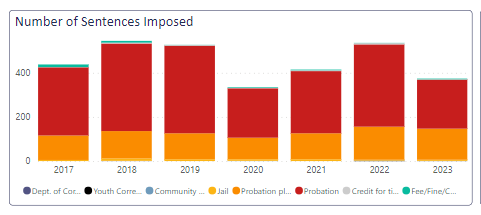DUIs in Mesa County
Felony/Misdemeanor DUIs in Mesa County
A DUI (Driving Under the Influence) or DWAI (Driving While Ability Impaired) charge is generally a misdemeanor in Colorado. A felony DUI is charged when someone has three or more prior DUI convictions or a defendant caused an accident that killed or injured another person while under the influence of alcohol or drugs. Upon a fourth conviction, a defendant may be sentenced to prison. The District Attorney deems these cases to be among the most serious offenses in Mesa County, as public safety is paramount.
Since 2017, felony DUI case filings have ranged from 4 cases at the lowest to 21 cases at its highest (on a quarterly basis). The data has remained fairly consistent with an average of 10 cases filed at any given quarter.
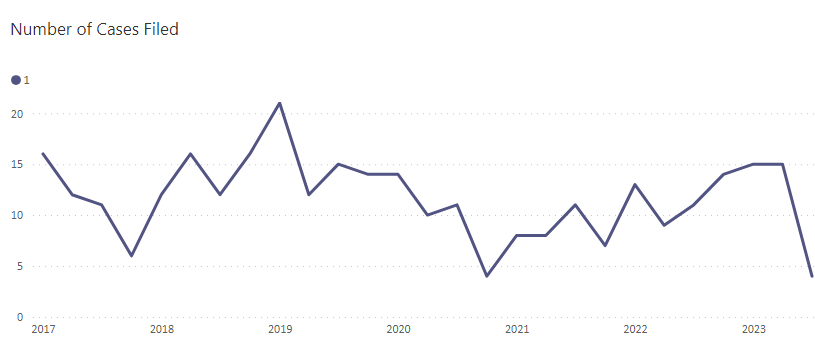
In 2022, there were 47 felony DUIs charged in Mesa County. As of September 30, 2023, our office has charged 34 felony DUIs. This is consistent with 2022.
Driving while under the influence occurs when a person drives a motor vehicle when his/her blood alcohol content (BAC) is 0.08 or more at the time of driving or within two hours of driving, and therefore was substantially impaired by drugs and/or alcohol. Driving While Ability Impaired occurs when a person drives a motor vehicle while impaired to the slightest degree, or between a .05 and a .08 BAC. In 2022, there were 559 misdemeanor DUIs/DWAIs charged in Mesa County. In 2023, 401 misdemeanor DUI/DWAI cases have been charged as of September 30, 2023. This is trending to end the year consistent with 2022.
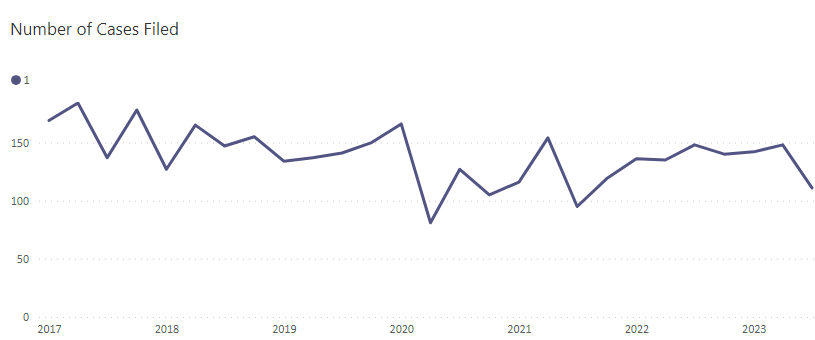
Case Resolution of DUIs
In 2022, the District Attorney’s Office resolved 46 felony DUI cases. This year, we have resolved 28 cases as of September 30, 2023. This coupled with the amount of felony DUI cases we have charged (34 this year) means there is a slight backlog in the system of unresolved felony DUIs. The District Attorney’s Office is very careful in charging felony DUIs, as well as resolving DUI cases in general. Very rarely are these cases dismissed outright. District Attorney Dan Rubinstein believes these crimes compromise public safety and these offenders should be held accountable.
Below is a breakdown of how felony DUI cases are resolving:
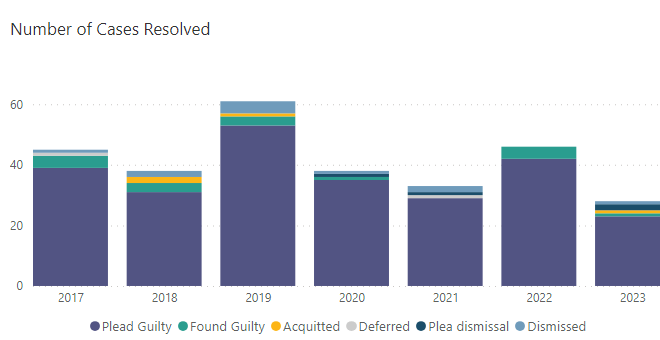
Timeliness
Resolving cases in an appropriate amount of time relieves our staff and Courts of unnecessary time spent working on a resolution.
Felony DUI Case Resolution:
The graph below shows the average number of hearings completed to reach a resolution in felony DUI cases. Since 2017, our trend shows we are increasing the number of hearings to resolve these matters from 11 to 14 hearings per case.
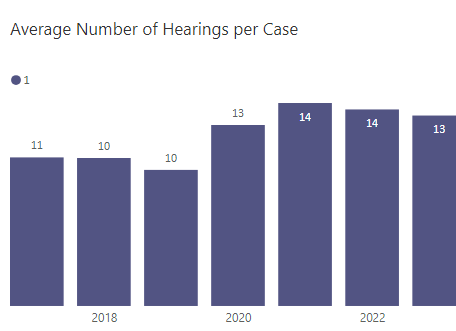
The graphs below shows the average and median number of days it is taking us to reach a resolution in felony DUI cases. In January, 2017 it was taking 225 days to resolve these cases. In 2023 (as of September 30th) it is taking 335 days to resolve.
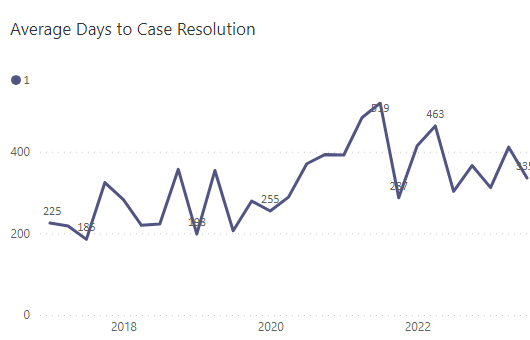
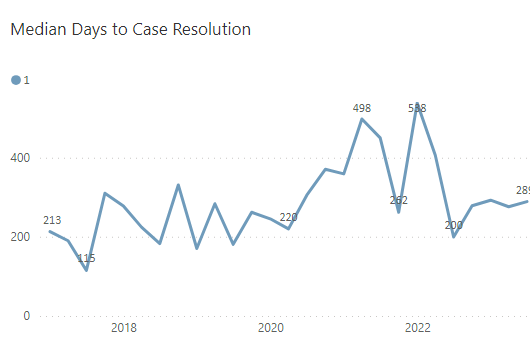
When faced with this data we began to investigate why this is taking us longer. While we can’t say with certainty any one factor is driving this trend, we can opine that the following factors impact the amount of time it takes to resolve a felony DUI case:
- When law enforcement arrests on a DUI stop, the blood samples are sent to a lab for testing. Delays occur during this lab analysis. After the results are made available, the Deputy DA provides the results to the defendant and the case begins moving again.
- Body-worn Camera is part of every case. It takes a significant amount of time to review the footage obtained by the officers’ cameras.
- Our policy is to take a hard line on repeat DUI offenders as we believe public safety is most important. When we cannot offer an attractive plea offer to defendants we are most likely going to be set for trial and a jury will decide the defendant’s guilt or innocence.
- In our jurisdiction, it is our office policy not to offer DUI offenders Diversion or a Deferred Judgment and Sentence (which give the Defendant a chance to resolve their case without a conviction). Some jurisdictions in Colorado allow these options for this type of case; we do not in Mesa County.
- If the Defendant is out of custody (bonded out of jail) any trial setting may be continued for those defendants in custody awaiting trial.
- Staff turnover. When prosecutors leave or switch caseloads, it takes a while for the new prosecutor to familiarize themselves with these new cases and this slows down time to resolution. The same holds true when the defendant’s attorney changes during the case.
Misdemeanor DUI Case Resolution:
The graph below depicts the average number of court hearings it takes to resolve a misdemeanor DUI case.
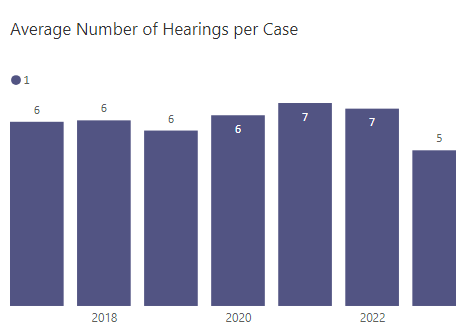
As you can see, it is significantly different from felony DUIs both in average hearings per case (5 hearings for misdemeanors and 13 for felonies) and days to resolution (168 days compared to 335 for Felony DUI cases). Misdemeanor DUI cases may resolve more quickly for various reasons: streamlined procedure in place for all misdemeanor DUIs, offenders with misdemeanor DUIs may not be represented by an attorney and appear pro se, and more risks and consequences at stake for felony DUI offenses.
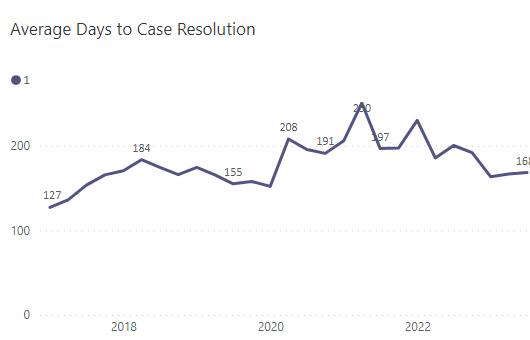
DUI Sentencing
As demonstrated by the charts below, numerous sentencing options are available and imposed on felony DUI cases: probation, jail, community corrections, and prison. The consequences become more significant for felony DUIs. For misdemeanor DUI prosecution, rehabilitation is a major focus.
Felony DUI Sentences

Misdemeanor DUI Sentences
